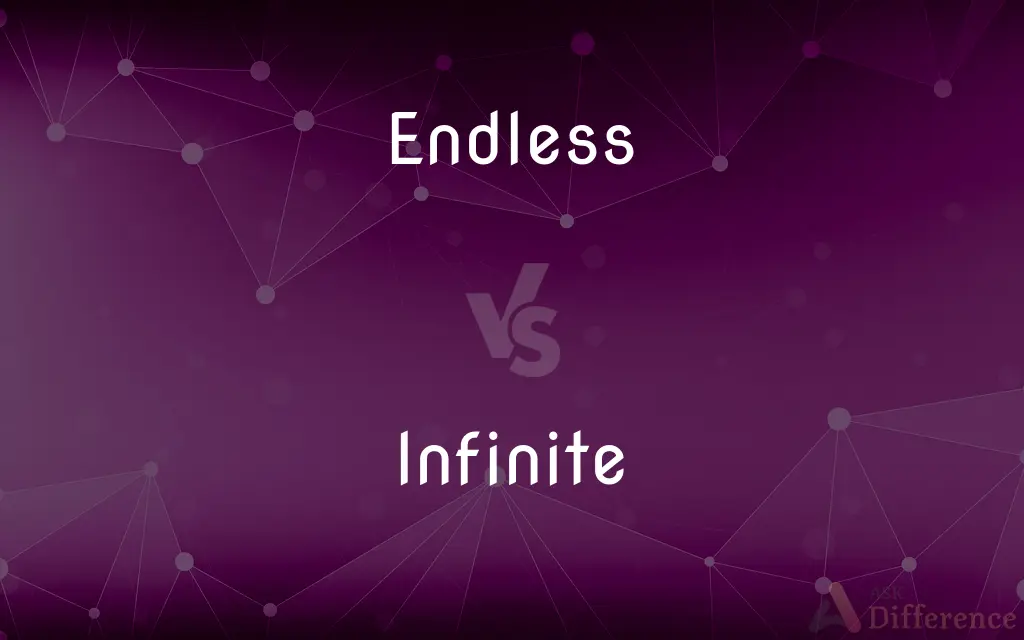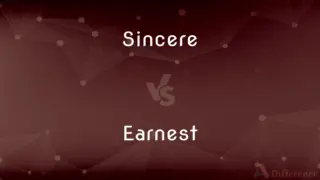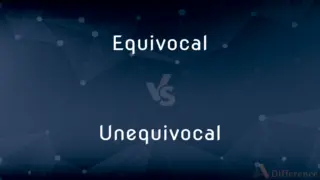Endless vs. Infinite — What's the Difference?
Edited by Tayyaba Rehman — By Fiza Rafique — Updated on March 21, 2024
Endless refers to something without a perceived end, often used metaphorically, while infinite suggests a lack beyond measure or comprehension.

Difference Between Endless and Infinite
Table of Contents
ADVERTISEMENT
Key Differences
Endless often describes things that seem to have no conclusion or boundary, such as a path or a task, implying a very long duration or extent. On the other hand, infinite is used in more abstract, mathematical, or philosophical contexts, indicating something without any limits or boundaries whatsoever.
In terms of perception, endless might be applied to tangible or experiential situations, like an endless road, where the end is not visible or seems very far. Infinite, however, is more commonly used for conceptual or quantifiable extents that are beyond any possible measurement, such as the infinite possibilities in the universe.
Endless can sometimes imply a tiresome or overwhelming aspect, as in an endless list of chores, suggesting something that feels like it will never be completed. Infinite, conversely, carries a sense of awe or vastness, as in the infinite stars in the sky, highlighting an unquantifiable expanse.
While endless is often used in a more figurative or hyperbolic sense, infinite is typically employed in discussions that involve scale, magnitude, or theoretical concepts that genuinely have no end or limit.
Comparison Chart
Context
Often used metaphorically for tangible or experiential situations
Primarily used in abstract, mathematical, or philosophical contexts
ADVERTISEMENT
Perception
Implies a very long duration but not necessarily beyond all measure
Suggests a quantifiable or conceptual extent that is beyond any possible measurement
Connotation
Can imply a tiresome or overwhelming aspect
Carries a sense of awe or vastness
Usage
More figurative or hyperbolic
Involved in discussions about scale, magnitude, or theoretical concepts
Example Situations
Endless road, endless list of chores
Infinite possibilities, infinite stars in the sky
Compare with Definitions
Endless
Having or seeming to have no end or limit.
The desert stretched into the horizon in an endless expanse.
Infinite
Limitless or unbounded in extent or size.
The universe is vast and infinite.
Endless
Tediously unchanging or repetitive.
The meeting felt like an endless loop of the same discussions.
Infinite
Unending; without end.
The possibilities for innovation are infinite.
Endless
Without interruption or conclusion.
The music festival went on for an endless night of fun.
Infinite
Immeasurably great or large.
The mathematician pondered the concept of infinite numbers.
Endless
Boundless or vast.
The library offered an endless source of knowledge.
Infinite
Without limits; boundless.
His patience seemed infinite.
Endless
Continuously ongoing.
The artist's creativity seemed endless.
Infinite
In mathematics, greater than any assignable quantity or countable number.
The set of natural numbers is infinite.
Endless
Being or seeming to be without an end or limit; boundless
An endless universe.
An endless conversation.
Infinite
Limitless or endless in space, extent, or size; impossible to measure or calculate
The infinite number of stars in the universe
The infinite mercy of God
Endless
Formed with the ends joined; continuous
An endless chain.
Infinite
Another term for non-finite
Endless
Having no end.
Endless time; endless praise
Infinite
A space or quantity that is infinite
Beyond the infinite, the space traveller is transformed
Endless
Extending indefinitely.
An endless line
Infinite
Having no boundaries or limits; impossible to measure or calculate.
Endless
(obsolete) Without profitable end; fruitless; unsatisfying.
Infinite
Immeasurably great or large; boundless
Infinite patience.
A discovery of infinite importance.
Endless
Without end; having no end or conclusion; perpetual; interminable; - applied to length, and to duration; as, an endless line; endless time; endless bliss; endless praise; endless clamor.
Infinite
Existing beyond or being greater than any arbitrarily large value.
Endless
Infinite; excessive; unlimited.
Infinite
Unlimited in spatial extent
A line of infinite length.
Endless
Without profitable end; fruitless; unsatisfying.
Infinite
Of or relating to a set capable of being put into one-to-one correspondence with a proper subset of itself.
Endless
Void of design; objectless; as, an endless pursuit.
Infinite
Something infinite.
Endless
Having a linear or ribbonlike form with the two ends connected together, such as in a circle, ellipse, torus, or any other closed loop. Belts or chains used in drive mechanisms are considered endless in this sense. See endless chain.
Infinite
Indefinably large, countlessly great; immense.
Endless
Tiresomely long; seemingly without end;
Endless debates
An endless conversation
The wait seemed eternal
Eternal quarreling
An interminable sermon
Infinite
Boundless, endless, without end or limits; innumerable.
Endless
Infinitely great in number;
Endless waves
Infinite
(with plural noun) Infinitely many.
Endless
Having no known beginning and presumably no end;
The dateless rise and fall of the tides
Time is endless
Sempiternal truth
Infinite
(mathematics) Greater than any positive quantity or magnitude; limitless.
Endless
Having the ends united so as to form a continuous whole;
An endless chain
Infinite
Having infinitely many elements.
Endless
Occurring so frequently as to seem ceaseless or uninterrupted;
A child's incessant questions
Your perpetual (or continual) complaints
Infinite
(grammar) Not limited by person or number.
Infinite
(music) Capable of endless repetition; said of certain forms of the canon, also called perpetual fugues, constructed so that their ends lead to their beginnings.
Infinite
Infinitely many.
Infinite
Something that is infinite in nature.
Infinite
(video games) A combo that can be used repeatedly without interruption.
Infinite
Unlimited or boundless, in time or space; as, infinite duration or distance.
Whatever is finite, as finite, will admit of no comparative relation with infinity; for whatever is less than infinite is still infinitely distant from infinity; and lower than infinite distance the lowest or least can not sink.
Infinite
Without limit in power, capacity, knowledge, or excellence; boundless; immeasurably or inconceivably great; perfect; as, the infinite wisdom and goodness of God; - opposed to finite.
Great is our Lord, and of great power; his understanding is infinite.
O God, how infinite thou art!
Infinite
Indefinitely large or extensive; great; vast; immense; gigantic; prodigious.
Infinite riches in a little room.
Which infinite calamity shall causeTo human life.
Infinite
Greater than any assignable quantity of the same kind; - said of certain quantities.
Infinite
Capable of endless repetition; - said of certain forms of the canon, called also perpetual fugues, so constructed that their ends lead to their beginnings, and the performance may be incessantly repeated.
Infinite
That which is infinite; boundless space or duration; infinity; boundlessness.
Not till the weight is heaved from off the air, and the thunders roll down the horizon, will the serene light of God flow upon us, and the blue infinite embrace us again.
Infinite
An infinite quantity or magnitude.
Infinite
An infinity; an incalculable or very great number.
Glittering chains, embroidered richly o'erWith infinite of pearls and finest gold.
Infinite
The Infinite Being; God; the Almighty.
Infinite
Having no limits or boundaries in time or space or extent or magnitude;
The infinite ingenuity of man
Infinite wealth
Infinite
Of verbs; having neither person nor number nor mood (as a participle or gerund or infinitive);
Infinite verb form
Infinite
Too numerous to be counted;
Incalculable riches
Countless hours
An infinite number of reasons
Innumerable difficulties
The multitudinous seas
Myriad stars
Untold thousands
Infinite
Total and all-embracing;
God's infinite wisdom
Common Curiosities
In what situations is 'infinite' more accurate than 'endless'?
Infinite is more accurate in scientific, mathematical, and philosophical discussions where the concept or quantity being described truly has no bounds or limits, beyond the scope of measurement.
Can something be both endless and infinite?
In a metaphorical sense, something might be described as both if it seems to extend beyond any perceivable limits or comprehension, but technically, infinite suggests a greater scale of limitlessness than endless.
What contexts are appropriate for using 'endless'?
Endless is suitable for both literal and metaphorical contexts, often to describe situations, objects, or time periods that seem to go on for a very long duration without a visible conclusion.
What does endless mean?
Endless refers to something that has or seems to have no end, limit, or conclusion, often used to describe situations or entities that extend for a very long duration.
How is infinite different from endless?
Infinite implies a state or quantity that is beyond any possible measure or comprehension, often used in abstract, mathematical, or philosophical contexts, whereas endless often describes things with a very long duration but not necessarily immeasurable.
Can the human mind truly comprehend 'infinite'?
The concept of infinite is challenging for the human mind to fully grasp, as it extends beyond the finite experiences and measurements that we are accustomed to.
Is 'infinite' used only in a positive context?
Not necessarily. While infinite often carries a sense of awe or vastness, it can also be overwhelming or hard to comprehend, depending on the context.
How do mathematicians define 'infinite'?
Mathematicians define infinite as a quantity or concept that is larger than any assignable or countable number, often dealing with sets or sequences that have no end.
Is the universe endless or infinite?
The universe is often described as infinite in scientific discussions, suggesting its scale and the quantities within it are beyond any current measure or comprehension.
How do you use endless and infinite in a sentence?
Endless: "The winding road seemed endless as it stretched into the distance."Infinite: "The mathematician explained the concept of infinite series in her lecture."
Can art or literature be described as 'infinite'?
Art or literature can be described as infinite in a metaphorical sense, referring to the boundless interpretations, meanings, or emotional responses they can elicit.
Can 'endless' have a negative connotation?
Yes, endless can have a negative connotation when used to describe something tedious, monotonous, or overwhelming, such as an endless list of tasks.
How does the perception of time relate to 'endless' and 'infinite'?
The perception of time can be described as endless in contexts where it seems to drag on indefinitely, whereas infinite time would imply a conceptual or philosophical perspective where time has no beginning or end.
What is the difference between 'endlessly' and 'infinitely' in adverbial form?
Endlessly refers to doing something in a manner that seems to have no end, often used for actions or processes, whereas infinitely refers to the boundless degree or manner in which something is done, often with a sense of immeasurability.
Is 'endless' more commonly used in everyday language than 'infinite'?
Yes, endless is more commonly used in everyday language to describe situations or objects that have a prolonged duration or extent, while infinite is more specific to contexts that require a sense of boundlessness.
Share Your Discovery

Previous Comparison
Sincere vs. Earnest
Next Comparison
Equivocal vs. UnequivocalAuthor Spotlight
Written by
Fiza RafiqueFiza Rafique is a skilled content writer at AskDifference.com, where she meticulously refines and enhances written pieces. Drawing from her vast editorial expertise, Fiza ensures clarity, accuracy, and precision in every article. Passionate about language, she continually seeks to elevate the quality of content for readers worldwide.
Edited by
Tayyaba RehmanTayyaba Rehman is a distinguished writer, currently serving as a primary contributor to askdifference.com. As a researcher in semantics and etymology, Tayyaba's passion for the complexity of languages and their distinctions has found a perfect home on the platform. Tayyaba delves into the intricacies of language, distinguishing between commonly confused words and phrases, thereby providing clarity for readers worldwide.
















































